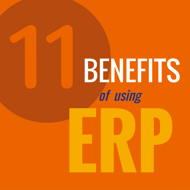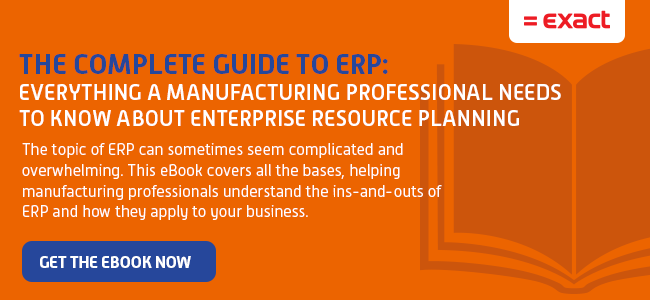11 Reasons Why a Manufacturing Company Should Implement ERP
 It’s getting tougher to stay competitive in the manufacturing industry. Companies are striving to become more efficient, ensure regulatory compliance, improve customer service, and more effectively utilize resources in order to stay competitive. Luckily, there’s a solution to help accomplish all of these objectives.
It’s getting tougher to stay competitive in the manufacturing industry. Companies are striving to become more efficient, ensure regulatory compliance, improve customer service, and more effectively utilize resources in order to stay competitive. Luckily, there’s a solution to help accomplish all of these objectives.
You’ve probably heard of ERP, and maybe read a few things on the internet about all the benefits it can provide. But if you’re like other manufacturing professionals, you’re concerned that the stories sound too good to be true. You wonder, can ERP really work for my business and deliver on all that the vendors promise? The fact is, ERP can do all this and more. We have seen it happen time after time, and witnessed manufacturing companies reach their goals by implementing an ERP solution firsthand. And if you’re thinking you can’t afford an ERP system, that’s simply not the case. If you choose the right vendor, ERP is affordable, even for a small business.
Some of the main benefits of ERP software are:
1. ERP enables growth
Many companies feel that they can make do using spreadsheets or manual lists to manage their business, but this decision may make growth a slower and more painful process than it needs to be. By putting an ERP system in place, your company will not only be able to better manage your inventory and resources, but you’ll also have access to more reliable information upon which to base important business decisions which will fuel growth.
2. ERP creates efficiencies
If you’re running things manually, you might find it hard to enforce common processes across your organization. Consistency is the key to efficiency in manufacturing, and ERP creates the consistency needed to streamline your manufacturing processes and improve deliverability. ERP helps you automate tasks so you and your employees can shift focus to value-added activities and spend less time on administrative tasks.
3. Consolidate disparate databases
If there is a lot of paper moving around your company, but very little real communication occurring, an ERP solution can help. ERP provides a single source of truth and enables you to improve communication between departments. Instead of storing important documents and spreadsheets on personal computers, you can house all your important documentation in a centralized database that eliminates redundancies. Once a piece of information is entered in your ERP system, it automatically flows to every area that may need or use that piece of information. This increases data accuracy because there is no need for duplicate entry of any piece of information. When every employee can access the specific information they need quickly, all from the same integrated system, your entire business runs more smoothly and you waste less time hunting down information and verifying its accuracy. With all this data at your fingertips you can analyze and adjust production issues as they arise, instead of waiting weeks or months to react to issues and make modifications.
4. Manage compliance and regulatory requirements
Do you operate in a regulated industry such as electronics, medical device or food processing? If so, you know that failing to meet quality and compliance standards can lead to large fines as well as unhappy customers. ERP helps you avoid such situations because it helps you define processes to manage regulatory requirements and maintain compliance. An ERP system also makes it easier for you to keep detailed records of all activities for audits and other historical purposes, without the fuss of manual tracking and processing. ERP can help ensure that your team adheres to proper procedures, so that you can rest easy.
5. Conduct accurate material planning and control inventory
Perhaps you have trouble maintaining accurate inventory counts and your physical counts seldom match your perpetual inventory records. This wreaks havoc with your production efficiency, since parts are not available when you need them. Now you’re dealing with delivery delays that upset your customers who will eventually find a vendor that has a better handle on their business. ERP helps you address all these issues. With ERP in place, you can improve your on-hand inventory visibility, increase accuracy and reduce overhead. As a result, in only a short period of time, you’ll start to see planning, scheduling and customer service improvements.
6. Accurately cost your product
An ERP solution will help you quantify the cost of labor, time, and equipment, and know exactly how much material and labor every order, part and operation consumes. Use ERP to track cost variances for material costs, labor costs and purchase costs. Your accountants and auditors will be able to see a full range of reports and inquiries that will help them analyze cost performance and easily compare actual costs with planned costs.
7. Deliver product on time
Your customers expect to be given reliable shipment and delivery dates when they place an order. Most likely, they do not want to wait for a call back, and they won’t accept bad dates for too long before they move on to another supplier. Well, ERP can help in this situation. ERP gives you available-to-promise capabilities so your sales and customer support teams can better manage opportunities and provide accurate delivery information from the start. MRP and production scheduling capabilities provide the information your teams need to make decisions on expediting, overtime and other factors.
8. Create meaningful reports with ease & efficiency
Manual systems are error prone. Without an ERP system in place, you may find that your business information is not reliable. You (or others at your company) may also be relying too heavily on guesswork or “rules of thumb,” which can lead to ineffective decision-making. An ERP system will help you combat these challenges by collecting a robust amount of data that can be used to build meaningful reports. With those reports, you can achieve the level of transparency you need in order to make sound business decisions.
9. Improved customer service
Companies that treat customer service as a top priority fortify the intimacy of their customer relationships and in turn retain a high level of customer satisfaction. The most efficient ERP software packages allow you to access every detail about a client from one screen, including order inquiries, billing information, invoices, and both past and current orders. This keeps all members of a sales team informed, eliminating time needed to hunt down the right person to answer a customer’s question.
10. Improved decision-making ability for management
Without ERP, management has to either wait until the numbers come in at the end of the month or quarter to make decisions, or make decisions based on data that is weeks or months old. Because ERP puts timely and accurate information at management’s fingertips, numbers can be analyzed in real time. This allows management to make present-day decisions based on current data at any given time of the year, and also to make better decisions for the long term.
11. Level the technology playing field across all departments
Rather than having different programs and technologies used in different departments, an ERP system puts everyone in the organization on a level playing field when it comes to data and technology. This allows for increased visibility across departments, a better understanding of how each facet of the organization operates and ultimately enhanced teamwork. Less frustration and improved collaboration can improve morale and strengthen company loyalty.
Implementing ERP has, without a doubt, helped countless businesses reach their goals. Outside of the eleven top benefits highlighted above, there are other intangible benefits that manufacturing companies stand to gain by implementing ERP. Want to see for yourself? Click here to get a personalized, hands-on product tour to see what your company can achieve with ERP software.






